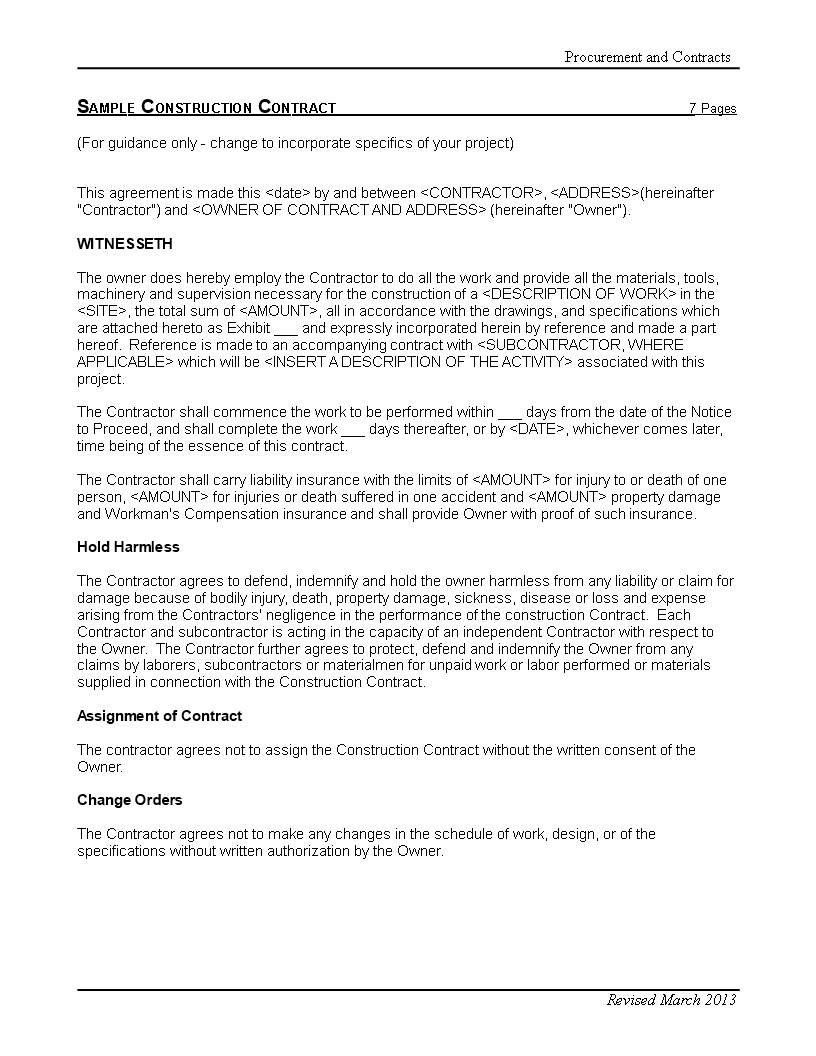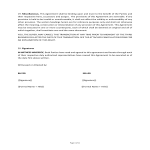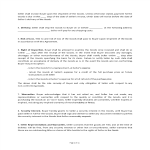Sample Construction Contract

Enregistrer, Remplir les champs vides, Imprimer, Terminer!
How does a construction contract work? In what way does a construction contract agreement serve its purpose? Download our sample template which is designed to cover all of the most important terms and conditions of a construction contract.
Formats de fichiers gratuits disponibles:
.doc- Ce document a été certifié par un professionnel
- 100% personnalisable
Business Entreprise contract Contrat work travail contractor entrepreneur construction government gouvernement law loi shall doit Private Law Loi privée Virtue Vertu Common Law Loi commune Social Institutions Institutions sociales Justice Government Information Information du gouvernement Business Law Droit des affaires Civil Law (Legal System) Droit civil (système juridique) Indemnity Indemnité Mortgage Law Loi hypothécaire Owner Propriétaire Legal Concepts Concepts juridiques General Contractor Entrepreneur général Arbitration Arbitrage
How does a construction contract work? In what way does a construction contract agreement serve its purpose? Our templates have been designed to cover all of the most important terms and conditions of a construction contract. Download this sample template now and use this to make a contract for your construction company!
A construction contract is a legally binding agreement between two parties, typically a client or owner and a contractor, that outlines the terms and conditions for a construction project. This document specifies various aspects of the project, including the scope of work, project timeline, payment terms, responsibilities of each party, and other important details. The primary purpose of a construction contract is to protect the interests of both the client and the contractor by providing a clear framework for the project and helping to prevent disputes and misunderstandings.
Key elements typically found in a construction contract include:
- Scope of Work: A detailed description of the work to be performed, including architectural plans, specifications, and any other relevant project documents.
- Project Timeline: The contract should specify the project start and completion dates, as well as any intermediate milestones.
- Payment Terms: This section outlines the payment schedule, including the total contract price, progress payments, and any retainage amounts.
- Change Orders: Procedures for handling changes or modifications to the original scope of work, including how additional costs and time extensions will be addressed.
- Responsibilities: Defines the responsibilities of the client and the contractor, including who is responsible for obtaining permits, providing materials, and meeting other project requirements.
- Quality and Performance Standards: Specifies the quality standards and performance expectations for the construction work, including the use of specific materials and construction methods.
- Dispute Resolution: Outlines the procedures for resolving disputes or disagreements that may arise during the project, which could include mediation, arbitration, or litigation.
- Termination: Conditions under which the contract can be terminated by either party, as well as the consequences of such termination.
- Insurance and Liability: Addresses insurance requirements and liability coverage to protect against accidents, damages, or injuries during the construction project.
- Warranties: Details any warranties provided by the contractor for the work, materials, or equipment used in the project.
Construction contracts can take various forms, such as lump-sum contracts, cost-plus contracts, time and materials contracts, and more, depending on the specific needs of the project and the preferences of the parties involved. It's essential for all parties to thoroughly review and understand the terms of the contract before signing to ensure that their interests and expectations are adequately addressed and protected. Consulting with legal counsel or a construction professional is often advisable when drafting or entering into a construction contract.
AVERTISSEMENT
Rien sur ce site ne doit être considéré comme un avis juridique et aucune relation avocat-client n'est établie.
Si vous avez des questions ou des commentaires, n'hésitez pas à les poster ci-dessous.



